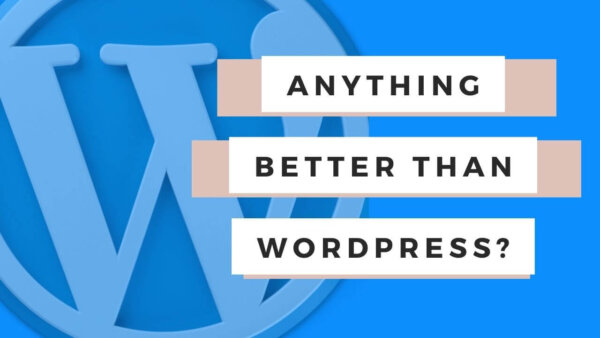The answer really depends on the website functionality you are trying to create and your skill level or perhaps ability to hire developers in order to execute your project. In this article I’ll try to describe where to draw the line on WordPress but most of the time WordPress can handle most projects most of the time.
// Table of Contents
// What projects can WordPress handle?
Generally speaking WordPress can handle 99% of the projects you are likely to throw at it but scale might change this (see note below). Better yet if you want to do it yourself there is no better website software on the market for you to do it yourself while staying low cost. You might still need to pay for some plugins but even this cost is likely smaller than asking a developer to do it for you.
NOTE: The scale and size of any projects which I am saying ‘WordPress can handle’ in this section could change that fact. Mainly the issue is by your definition of ‘handle’. Sometimes WordPress will become very slow with multiple thousands or posts (or products). It can be speed up but it becomes a mess of caches, custom code and plugins in order to ‘strap up’ the site and get it to be performant. And even then it might not be possible to do things as fast as you’d like.
Here are some examples of projects with which WordPress can handle easily.
- ‘A brochure type site‘ like for a hairdresser or hardware store or small business. These websites more or less just need a services page, a contact page (with an email contact page), a home page, maybe some blog pages. If you are looking to do reservations (ie appointments for a hairdresser for eg) then there are plugins which can extend the basic WordPress functionality also.
- ‘e-commerce Sites‘ for people selling online WordPress and its related plugins (like WooCommerce) can easily handle listing products and taking payments. Many many products can be listed
- ‘Multi Level Marketing Sites‘ can also be handled. You would likely have a few different plugins to install and manage which would probably come at some monthly subscription costs but it’s possible.
A note on customization of plugins and how much functionality you can get out of the box:
WordPress works off of a free core set of software but has free and paid plugins to add functionality. Creating a WordPress store will always involve adding some plugins. You can install them yourself from the WordPress CMS but these are sometimes not exactly what you need and so some customization with custom code is sometimes required.
I often tell my clients that making a website with WordPress is a bit like buying a house instead of getting one custom built for you. You more or less are getting on the property market and you might not find exactly the layout that you’d like out of the box so you may do some renovations to it to get it the way you like it. The same is true of a WordPress site. You might get 70%-90% of what you’d like and you can ask a developer to customize the rest.
PROTIP: Also, I find that some WordPress owners will grow out of their website if its successful and grows to the point of being able to warrant a custom site then you can tackle that down the road. In my experience some e-commerce sites might outgrow WordPress eventually (let’s say within a few years) but also many people stick with WooCommerce all the way through and it works for them.
// What projects can’t WordPress handle?
I think that WordPress can handle 99% of the sites you might need. In some specific circumstances you might want a different software and in this section I’ll try to outline that below.
You have developers on your team:
If you have a team of developers (most small to medium sized companies don’t) then they may have their own preferences for the technology the use. If you are an experienced PHP developer then you most likely don’t need the ‘training wheels’ that WordPress represents.
In saying that some teams and developers may like the combination of WordPress and custom coding. It is possible to do both. For example the, ‘headless cms‘ trend or the last 5-10 years can combine the benefits of of a well known CMS and a developer friendly experience of the front end.
You know you will have a large site:
In my experience you may not want to use WordPress for any site which is large and is still required to be fast on the front end. WooCommerce (e-commerce on WordPress for eg) can become slow to search and display the database if there are many many products. I’m talking 5000 – 10,000 products.
You know you will have some complicated business logic that needs replicating on a site:
If your website needs some very custom business rules met then it may not be suitable for WordPress. This is because there could be too much customization required of the plugins. I think this is a minority of projects but I have been involved with a very specific ‘multi level marketing’ (not a pyramid scheme :P) in which it became apparent that their business rules and the reporting needs really stretched WordPress and it would have been more simple to just use another software like Laravel or Silverstripe.


